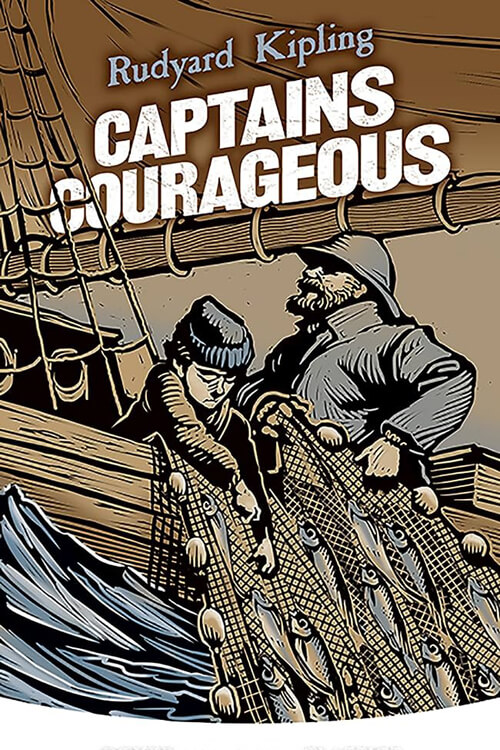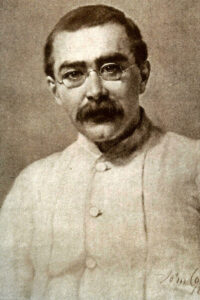
Captains Courageous, A Story of the Grand Banks
When he woke he listened for the first breakfast bell on the steamer, wondering why his stateroom had grown so small. Turning, he looked into a narrow, triangular cave, lit by a lamp hung against a huge square beam. A three-cornered table within arm’s reach ran from the angle of the bows to the foremast. At the after end, behind a well-used Plymouth stove, sat a boy about his age, with a flat red face and a pair of twinkling gray eyes. He was dressed in a blue jersey and high rubber boots. Several pairs of the same sort of footwear, an old cap, and some worn-out woolen socks lay on the floor, and black and yellow oilskins swayed to and fro beside the bunks. The place was packed as full of smells as a bale is of cotton. The oilskins had a peculiarly thick flavor of their own which made a sort of background to the smells of fried fish, burnt grease, paint, pepper, and stale tobacco; but these, again, were all hooped together by one encircling smell of ship and salt water. Harvey saw with disgust that there were no sheets on his bed-place. He was lying on a piece of dingy ticking full of lumps and nubbles. Then, too, the boat’s motion was not that of a steamer. She was neither sliding nor rolling, but rather wriggling herself about in a silly, aimless way, like a colt at the end of a halter. Water noises ran by close to his ear, and beams creaked and whined about him. All these things made him grunt despairingly and think of his mother.
“Feelin’ better?” said the boy, with a grin. “Hev some coffee?” He brought a tin cup full and sweetened it with molasses.
“Isn’t there milk?” said Harvey, looking round the dark double tier of bunks as if he expected to find a cow there.
“Well, no,” said the boy. “Ner, there ain’t likely to be till ‘about mid-September. ‘Tain’t bad coffee. I made it.”
Harvey drank in silence, and the boy handed him a plate full of pieces of crisp fried pork, which he ate ravenously.
“I’ve dried your clothes. Guess they’ve shrunk some,” said the boy. “They ain’t our style much — none of ‘em. Twist round and see if you’re hurt any.”
Harvey stretched himself in every direction, but could not report any injuries.
“That’s good,” the boy said heartily. “Fix yourself an’ go on deck. Dad wants to see you. I’m his son,—Dan, they call me,—an’ I’m cook’s helper an’ everything else aboard that’s too dirty for the men.
Read or download Book
Rudyard Kipling
Joseph Rudyard Kipling ( 30 December 1865 – 18 January 1936) was an English novelist, short-story writer, poet, and journalist. He was born in British India, which inspired much of his work.
Biography.
Kipling’s works of fiction include the Jungle Book duology (The Jungle Book, 1894; The Second Jungle Book, 1895), Kim (1901), the Just So Stories (1902), and many short stories, including “The Man Who Would Be King” (1888). His poems include “Mandalay” (1890), “Gunga Din” (1890), “The Gods of the Copybook Headings” (1919), “The White Man’s Burden” (1899), and “If—” (1910). He is seen as an innovator in the art of the short story.
His children’s books are classics; one critic noted “a versatile and luminous narrative gift”. Kipling in the late 19th and early 20th centuries was among the United Kingdom’s most popular writers. Henry James said “Kipling strikes me personally as the most complete man of genius, as distinct from fine intelligence, that I have ever known.” In 1907, he was awarded the Nobel Prize in Literature, as the first English-language writer to receive the prize, and at 41, its youngest recipient to date. He was also sounded out for the British Poet Laureateship and several times for a knighthood, but declined both.
Following his death in 1936, his ashes were interred at Poets’ Corner, part of the South Transept of Westminster Abbey. Kipling’s subsequent reputation has changed with the political and social climate of the age. The contrasting views of him continued for much of the 20th century.
Literary critic Douglas Kerr wrote: “[Kipling] is still an author who can inspire passionate disagreement and his place in literary and cultural history is far from settled. But as the age of the European empires recedes, he is recognized as an incomparable, if controversial, interpreter of how empire was experienced. That, and an increasing recognition of his extraordinary narrative gifts, make him a force to be reckoned with.”






